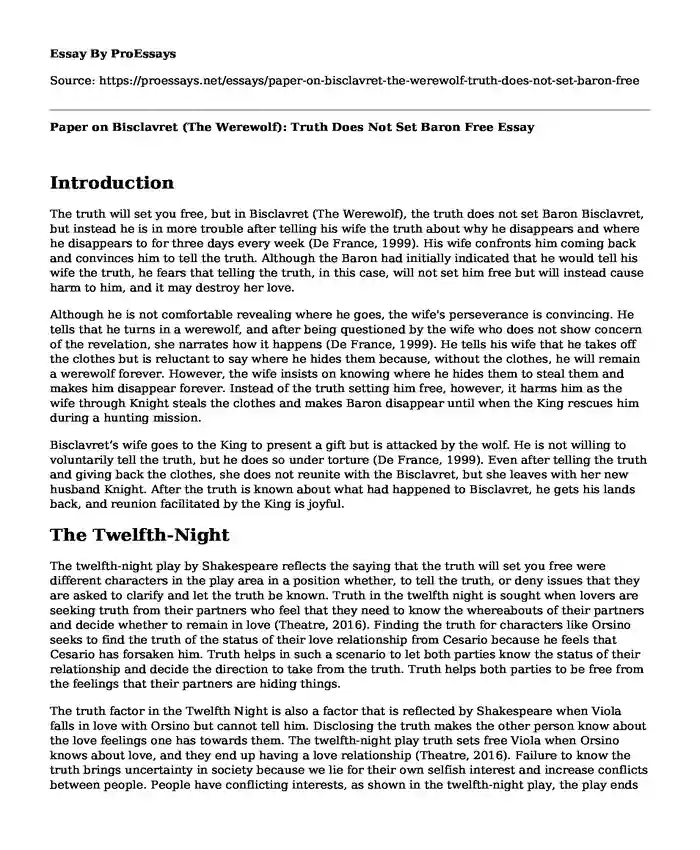Introduction
The truth will set you free, but in Bisclavret (The Werewolf), the truth does not set Baron Bisclavret, but instead he is in more trouble after telling his wife the truth about why he disappears and where he disappears to for three days every week (De France, 1999). His wife confronts him coming back and convinces him to tell the truth. Although the Baron had initially indicated that he would tell his wife the truth, he fears that telling the truth, in this case, will not set him free but will instead cause harm to him, and it may destroy her love.
Although he is not comfortable revealing where he goes, the wife's perseverance is convincing. He tells that he turns in a werewolf, and after being questioned by the wife who does not show concern of the revelation, she narrates how it happens (De France, 1999). He tells his wife that he takes off the clothes but is reluctant to say where he hides them because, without the clothes, he will remain a werewolf forever. However, the wife insists on knowing where he hides them to steal them and makes him disappear forever. Instead of the truth setting him free, however, it harms him as the wife through Knight steals the clothes and makes Baron disappear until when the King rescues him during a hunting mission.
Bisclavret’s wife goes to the King to present a gift but is attacked by the wolf. He is not willing to voluntarily tell the truth, but he does so under torture (De France, 1999). Even after telling the truth and giving back the clothes, she does not reunite with the Bisclavret, but she leaves with her new husband Knight. After the truth is known about what had happened to Bisclavret, he gets his lands back, and reunion facilitated by the King is joyful.
The Twelfth-Night
The twelfth-night play by Shakespeare reflects the saying that the truth will set you free were different characters in the play area in a position whether, to tell the truth, or deny issues that they are asked to clarify and let the truth be known. Truth in the twelfth night is sought when lovers are seeking truth from their partners who feel that they need to know the whereabouts of their partners and decide whether to remain in love (Theatre, 2016). Finding the truth for characters like Orsino seeks to find the truth of the status of their love relationship from Cesario because he feels that Cesario has forsaken him. Truth helps in such a scenario to let both parties know the status of their relationship and decide the direction to take from the truth. Truth helps both parties to be free from the feelings that their partners are hiding things.
The truth factor in the Twelfth Night is also a factor that is reflected by Shakespeare when Viola falls in love with Orsino but cannot tell him. Disclosing the truth makes the other person know about the love feelings one has towards them. The twelfth-night play truth sets free Viola when Orsino knows about love, and they end up having a love relationship (Theatre, 2016). Failure to know the truth brings uncertainty in society because we lie for their own selfish interest and increase conflicts between people. People have conflicting interests, as shown in the twelfth-night play, the play ends in a positive way as all the parties get the information and truth they want from their colleagues.
References
De France, M. (1999). The Lais of Marie de France. Retrieved 27 July 2020, from https://www.amazon.com/Lais-Marie-France-Penguin-Classics/dp/0140447598
Theatre, U. H. (2016). Twelfth Night (Shakespeare). http://128.171.57.22/handle/10125/58047
Cite this page
Paper on Bisclavret (The Werewolf): Truth Does Not Set Baron Free. (2023, Oct 28). Retrieved from https://proessays.net/essays/paper-on-bisclavret-the-werewolf-truth-does-not-set-baron-free
If you are the original author of this essay and no longer wish to have it published on the ProEssays website, please click below to request its removal:
- Of Mice and Men Essay - True Friendship Issue in a Literary Essay Example
- Critical Essay on Theme of Pride in Persepolis by Marjane Satrapi and the Kite Runner by Khaled Hosseini
- Desire and Risk in "The Sirens" Episode of The Odyssey Essay
- Literary Analysis Essay on Similarities Between Brain on Fire and Ten Days in a Madhouse
- Literary Analysis Essay on A Country Doctor
- Essay Example on Miss Emily's Unfortunate Life: A Study in Faulkner's A Rose for Emily
- Essay Example on Social Realism in Literature: Common People, Stories, and Places







